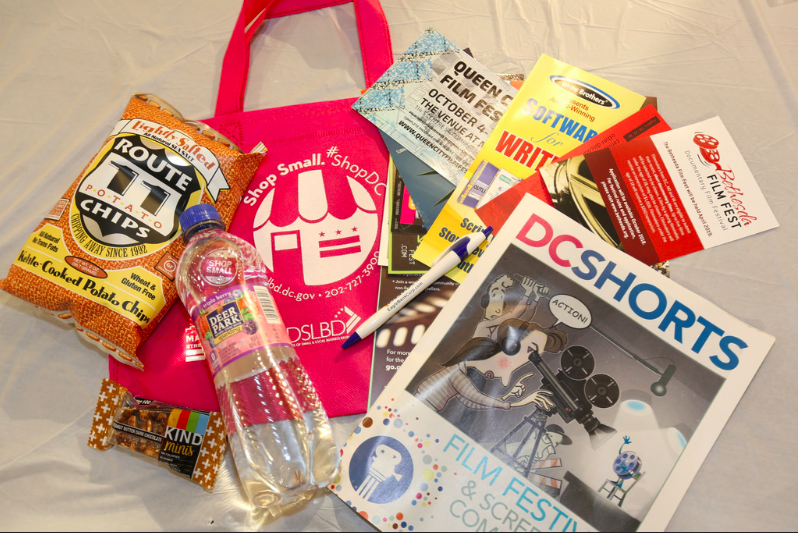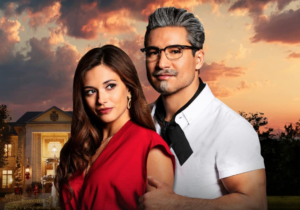In a city where politics reign supreme and attention spans are limited, a tweet can spark more conversation than a novel, a sound bite can change the course of an election— and a short film can haunt you for a lifetime. But barring viral success, short films lack the public platform available to feature-length movies. Artistic platforms are especially scarce in a city like D.C., where talk of government often drowns out creativity, harming the advancement of short films and those who create them. Enter the DC Shorts Film Festival and Screenplay Competition.
When you attend the ten-day-long festival at the Landmark E Street Cinema, you descend into an underground cinematic world unrecognizable from the city outside. Attendees are submerged in the depths of the movie house and traverse its labyrinthine basement hallways to intimate theaters. After the festival’s kickoff weekend—a series of parties and award ceremonies designed to allow filmmakers, screenwriters, and audience members to connect over their mutual love of films— the odyssey through the cinema sets the perfect tone for the film showcases at the heart of the event. Moviegoers isolate themselves from the hubbub and mundane anxieties of D.C. life to plunge into the lives of characters whose stories might not otherwise appear on the screen.
The festival included nine special showcases, each a 90-minute exhibition of short films defined by a common theme, from animation to coming-of-age to history. The special showcases tended to hone in on one common thread and presented shorts offering a variety of different angles and perspectives, leaving viewers with an abundance of diverse and powerful statements. One, “I Am Woman,” revolved around historical and contemporary women’s issues by exploring films about illness, abuse, and intersectionality. Another, “You Are Not From Around Here,” took an international perspective via the eyes of a French gang leader, an Arab doctor, and the president of Mexico.
The first film shown during “Ripped From the Headlines,” a special showcase of current events shorts, left the air thick with emotion and silence. Breathing felt too loud. A handful of strangers in an cozy theater were brought together by a common need to turn to each other and say the one thing we were all thinking. Finally, a man in the audience broke the spell. “Oh shit,” he said in disbelief, granting us all the permission to laugh nervously, as we braced ourselves for whatever story of grief was up next. Cue David Serink’s The Avocado.
The opening scenes are simple and heartwarming, just like most of the film. The main character, an older Latino man named Raul, fixes his hair in the mirror and practices how he might ask his coworker, Rosa, on a date during their lunch break. As the film unfolds, it becomes increasingly clear that Rosa and Raul both have crushes on each other, but neither one of them can work up the courage to tell the other. The audience was giddy when they finally did, watching two sweet people find love. Raul, dressed smartly in a suit, is ready to go so early that he kills time by pacing back and forth in his living room. There is a knock on his door—presumably Rosa. The scene cuts to Rosa beautifully done up in makeup and a dress, standing outside the restaurant and checking her phone. Meanwhile, Raul opens his door to two men and immediately tries to close it, but is instead bombarded with a series of questions about his identity. As he is being taken away by ICE, he tries to tell them that he has to get to Rosa. The short ends with a glowing shot of Rosa, sitting alone in the restaurant, gazing up at the band, waiting for a man who was never going to come.
In the silence after the film, one sound was distinct among the audience: sniffles. They became a constant throughout the showcase, as we confronted a series of difficult topics. The striking Sun Shine, directed by Walker Hare, follows a black girl as she tries to stop a depressed white man from shooting up his office. She is young and vibrant, but a film about gun violence in our current political climate could not end happily. She snatches the gun away from the man, but is dead minutes later, shot and killed by a police officer who only saw a black girl holding a gun. Like The Avocado, Sun Shine is hard to swallow because it echoes so clearly the tragedies of the contemporary world. It’s powerful because it’s true. You can’t forget the film’s image of the teenager being shot, you can’t forget Raul being dragged away by ICE—contrary to the way you can close a newspaper and walk away from it.
If you read the headlines every day, they are rarely uplifting. Yet the shorts had the power to make viewers feel a deep despair that a newspaper article never could because, like any good film does, they forced the audience to become attached to characters, to root for them even though, by virtue of the sinister events that make the headlines, they were never going to win.
“Cinema 10%” dove into the difficulties faced by the LGBTQ+ community. The night of the showcase, the theater was packed with a jovial crowd. As the lights went down and the first short began, the mood shifted. The first short, The World Is Round So That Nobody Can Hide In The Corners, opens with the sounds of heavy breathing so loud that they stirred a shiver at the base of each audience member’s spine. Within the first few seconds of the short, the entire atmosphere had shifted from excited to uncomfortable. As the gay couple shared an intimate moment on screen, the audience became viscerally aware of their positions as outsiders.
The short continues to tell the story of an African refugee who was kicked out of his home country for falling in love with another man. The film is entirely narrated by the man himself, who forces viewers to confront his reality and the lack of humanity he has been shown. The audience shifted anxiously in their seats as he numbly described his trauma, and it became clear that this account was not dramatic to him, but simply a fact of his life.
The audience members, many of whom were members of the LGBTQ+ community and sat beside their partners, seemed to be particularly affected by the narratives presented throughout “Cinema 10%.” At times, the room was filled with stunned silence. At others, nostalgia for first loves perfumed the air. One feeling remained consistent: a sense of pride over queer stories and the filmmakers who were given a platform to tell them.
The event is not only a celebration of the films themselves but also of their creators. Garnering a sense of community for artists in the DMV has been central to the mission of the DC Shorts Film Festival and its sponsors since its founding by local filmmaker Joe Gann in 2003. In an interview with the Voice, Melissa Houghton, executive director of Women in Film and Video, a sponsor of the festival, said, “We work in an emerging narrative film community and one way for filmmakers to test their wings is through short films.”
Three years after its founding, the success of the festival inspired its organizers to form the DC Film Alliance. The Alliance is a nonprofit dedicated to strengthening the film and media arts in D.C.—to both shine a spotlight on filmmaking in the area and perpetuate its existence. Along with the festival, the DC Film Alliance runs programs to support creators and disseminates information on local job listings and mentorship programs to help independent creators develop their skills. Although D.C. may not be recognized as a hub of creativity in the same way as New York City or Los Angeles, the DC Film Alliance argues that the creative work done here can be every bit as prolific and valuable.
Most of the festival’s partners are other local festivals and companies who share their mission of fueling creativity in the D.C. area. Otessa Ghadar, the executive director DC Web Fest, one of DC Shorts’ partners, wrote in an email to the Voice, “There is a tremendous amount of talent in the area, as well as internationally, and the creative community here deserves to be uplifted. Rising tides lift all boats as they say.”
In an effort to raise the tide, another program within the festival, the Screenplay Competition, offers a chance to win $2,000 toward the production of a screenplay. Each year, filmmakers are invited to submit screenplays, and a panel of judges including filmmakers, screenwriters, and critics select their top choices. The local film community—filmmakers, actors, and the audience members—are invited to hear the finalist entries read aloud by local actors at the Screenplay Competition. The audience votes on the screenplay that they would most like to see on screen at the following year’s festival.
The international culture of the D.C. area weaves itself in with the local culture, something that the creators of the festival strive to reflect. This year, the Best Local DMV Film Award went to recent George Mason University graduate Erblin Nushi for his film BINI. Nushi is a Kosovan filmmaker who became a refugee at the age of six, when he and his family were kidnapped by Serbian soldiers and taken to the Albanian border where they remained until the end of the Kosovo War. His short film BINI, which depicts this harrowing tale, is as anxiety-inducing as it is breathtaking. Foreign perspectives, like Nushi’s, from 30 countries reflected in the festival’s selected films, widening D.C.’s global outlook.
The DC Shorts Film Festival and Screenplay Competition helps filmmakers, especially District locals, flourish. Whether through screen-time, awards, or networks, DC Shorts is an essential event for the whole D.C. community, artists and audiences alike. Its emphasis on both local and international works is worth supporting, and the riveting new short films are a strong pull for any District cinephile. Ten days of such a thrilling festival may seem too short for local filmmakers and film-lovers, but sometimes shorter is better.




